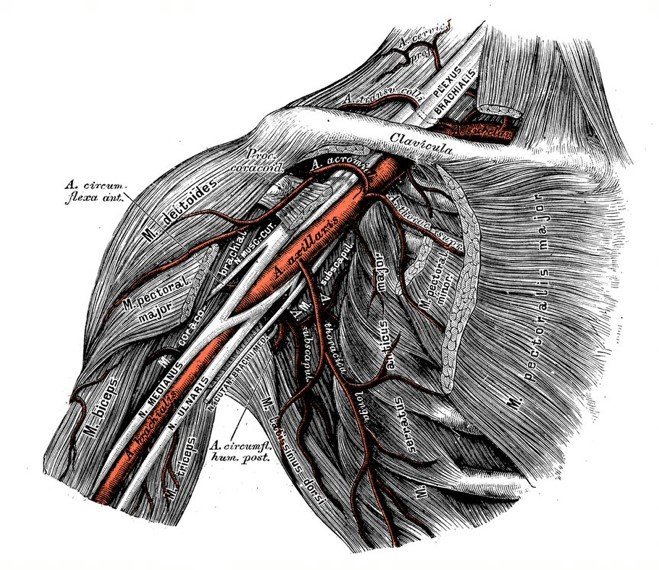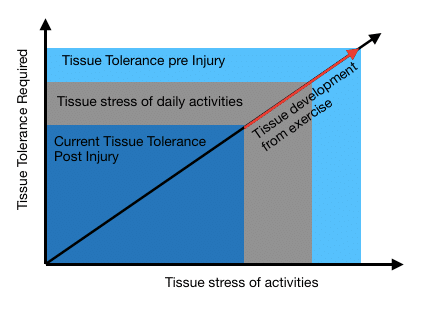Fitness and Performance
Training with a shoulder injury

Today we welcome our physiotherapist James Bainbridge back to the Bodyset blog. He’s looking at shoulder injuries – one of the most common issues affecting athletes. Should you train when you’re suffering from a shoulder injury, and how can a trip to a physiotherapist help you?
Can I still train with an injured shoulder?
Injuries to the shoulder are extremely common, especially in the athletic population. Injuries come in a variety of severities and locations. They can also be caused in a multitude of ways.
The Shoulder Complex

The shoulder complex is comprised of multiple bones, joints, ligaments, muscles, tendons, nerves and blood vessels. These structures work together to enable eight different planes of movement in our arm and shoulder blade. We use these movements each and every day. If one of the structures in the shoulder is compromised, the mechanics of the entire complex are affected. Your movement and ability to do everyday tasks are likely to be impacted. You may also feel pain and discomfort.
Suffering from a shoulder injury does not mean that you can’t use the arm at all. However, the type of injury will determine if and how you should train.
When not to train
- A traumatic injury to the shoulder – fracture or dislocation.
In these cases, it is very important that you do not continue to train without guidance from a medical professional. Further investigation is essential to confirm the diagnosis and ensure secondary complications have not occurred. Following this period, you will be advised to follow a progressive rehabilitation training programme. This will be overseen by a physiotherapist.
- Traumatic injury to the neck or head which causes any of the following, either initially or as a result of movement: loss of consciousness; difficulty swallowing; difficulty speaking; double vision; dizziness; fainting; loss of feeling in one or both arms; or vomiting.
In the event of these symptoms, immediately seek medical attention.
- Complete rupture of a ligament, muscle or tendon in your shoulder.
Diagnosis will be necessary – visit your doctor who will investigate using a form of imaging (MRI, CT, Ultrasound).
What you can train on:
- Strains to your muscles or tendons
- Sprains to your ligaments
- Arthritic changes in your joints
- Labral tears
- Frozen shoulder
- Dislocations, once relocated
- Fractures, once permitted by your doctor or surgeon
- Ruptured ligaments, muscles or tendons, once permitted by your doctor or surgeon
“But it hurts when I train on it!”
The main difficulty when you have a shoulder injury is creating an effective training plan. Although often painful, it is essential that you work to restore the movement and strength in your shoulder. You will also need to restore your previous levels of tissue stress tolerance.
Tissue stress tolerance is the level of physical stress that your biological tissue can handle. The level of everyday stress that you tolerate is very personal to you. For example, it can be anything from lifting a kettle to throwing a javelin. Your tissue stress tolerance will be reduced post-injury. Exceeding your post-injury tolerance can manifest in the form of pain when you perform a particular activity. You may also experience a reduction in strength when presented with that stress.
What can a physiotherapist do?
The role of your physiotherapist is to identify your injury and your baseline tissue stress tolerance. From there, they can create a tailored rehabilitation program. The program will be designed to provide the perfect amount of tissue stress to create physiological adaptation – but without causing you too much pain.
Following a bespoke plan like this can be difficult and may require a lot of patience and perseverance. However, by gradually increasing the stress in a manageable way over time, you will return to your normal activities and strength levels.
Reconditioning for a return to activity or sport is not just important right now. It will also help to prevent re-injury in the future

Hands up if you’ve ever tried to ignore an injury? When people first visit their physiotherapist, many have persevered with their training, hoping that the injury will go away. However, others have tried to rest and let their injury heal naturally. These examples are at either end of the tissue stress spectrum. By resting, people will often find no adaption has occurred. They will be unable to make their own return. On the other hand, continuing to train as normal can result in intensified pain and worsening the injury.
In summary…
Once you have ruled out a more serious injury in your shoulder, continuing with your training is not only permitted but encouraged. However, getting the balance in your shoulder training following an injury is very difficult. If you find yourself struggling, then speak to a physiotherapist for advice.
